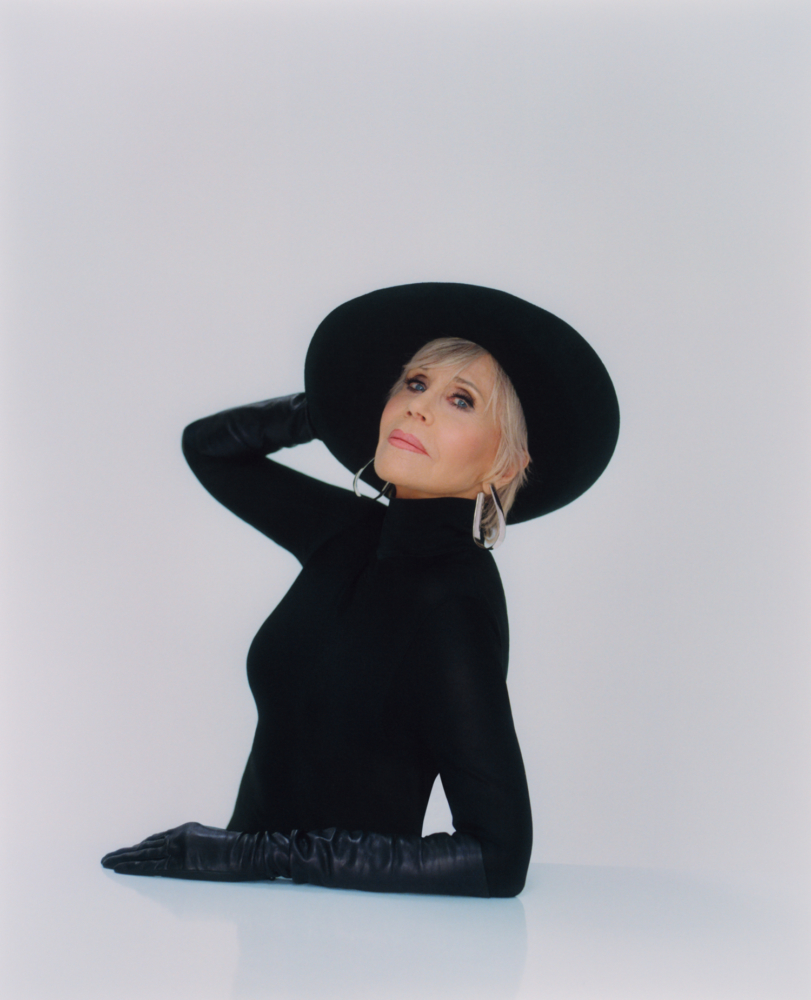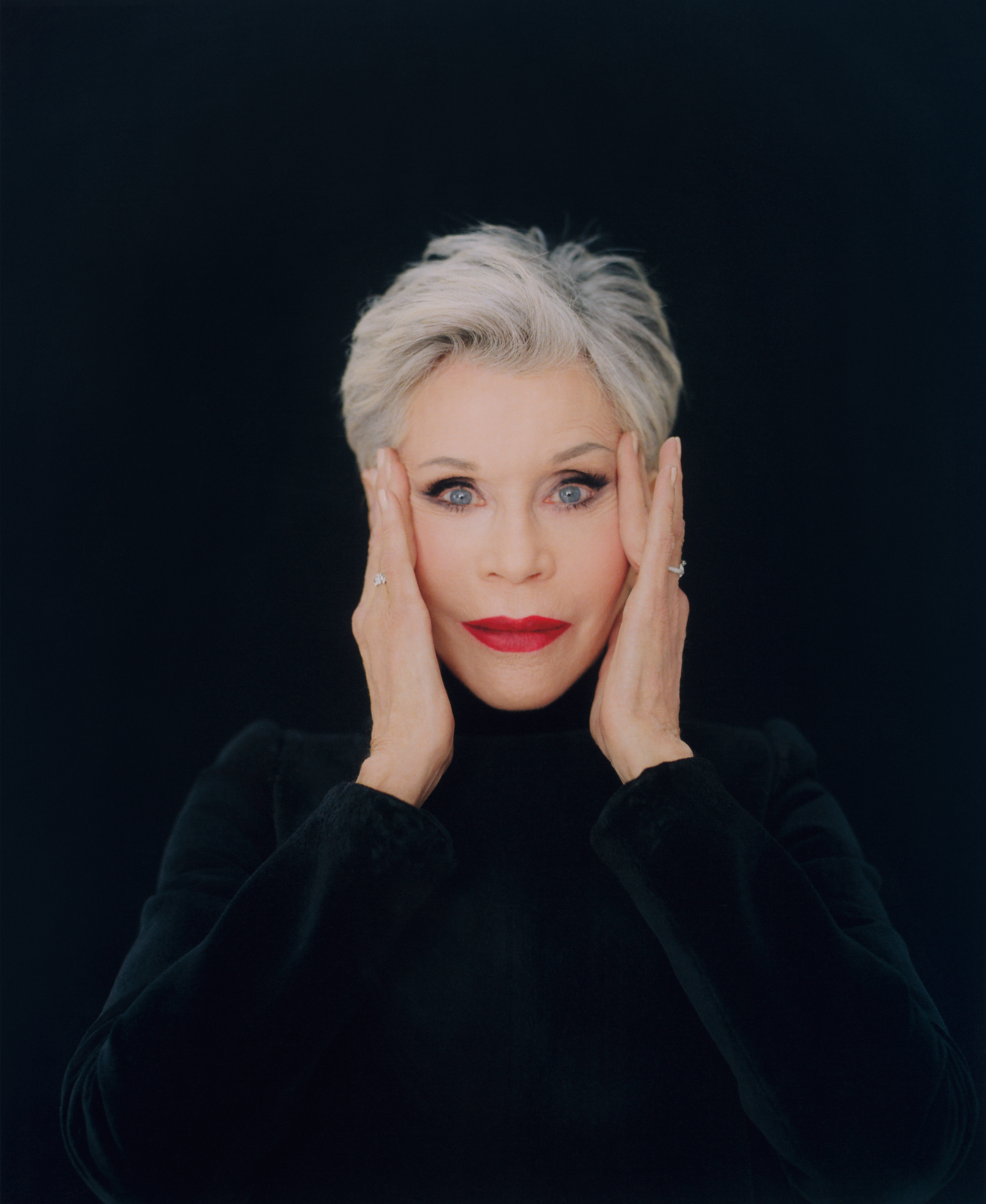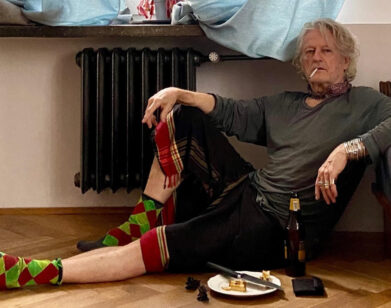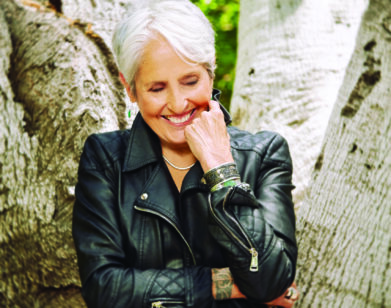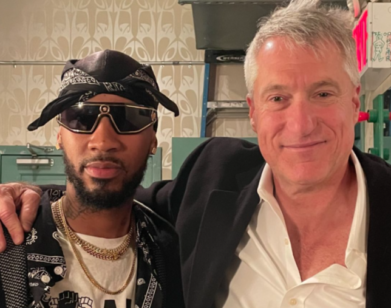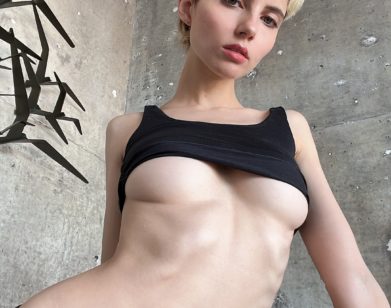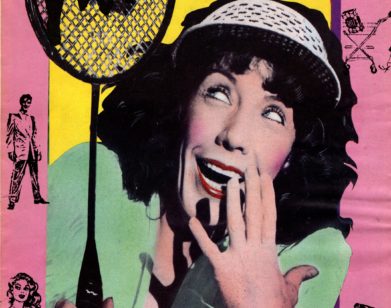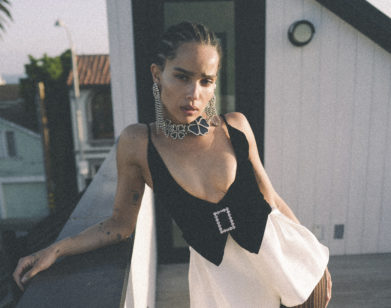ICON
Jane Fonda Tells Indya Moore How Her Lifelong Activism Prepared Her for This Moment
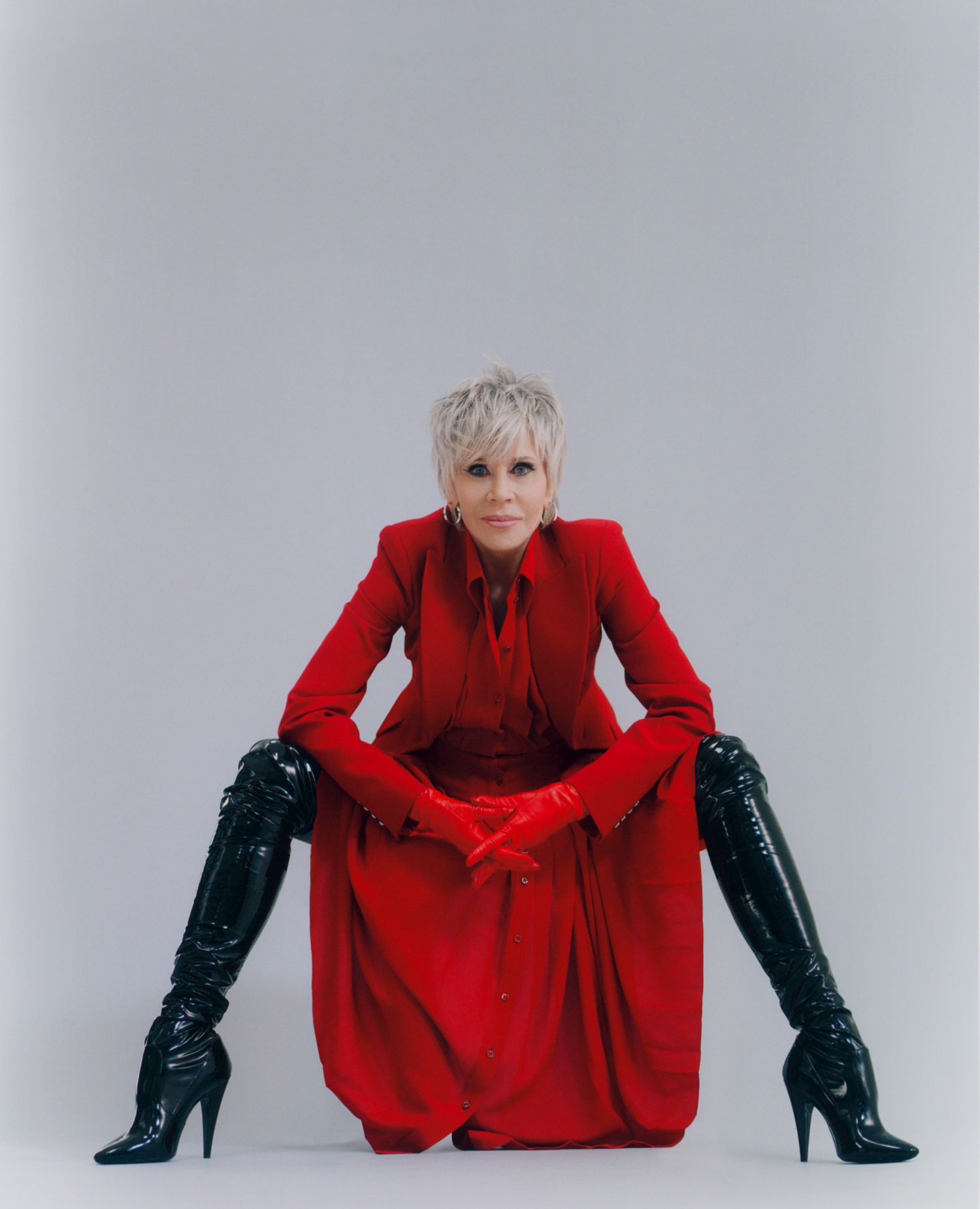
Blazer and Dress by Michael Kors Collection. Earrings by Cartier Love. Gloves Stylist’s Own. Shoes by Saint Laurent by Anthony Vaccarello.
Before taking a stand became a Hollywood rite of passage, there was Jane Fonda. If the two-time Academy Award-winning actor had stuck to making movies, her contribution to society would already have been immense. But when she picked up the mantle of activism in the late 1960s as a vocal opponent of the Vietnam war, her impact on our world became immeasurable. The daughter of the screen legend Henry Fonda, she became a star in her own right as a plucky outlaw in the 1965 shoot-’em-up send-up Cat Ballou. In 1968, she was the obsession of teenage boys everywhere as a molten-hot space warrior in the camp classic Barbarella. And in the ’70s, when her support for the Black Panther Party was attracting unwanted attention from the U.S. government—including illegal surveillance of her communications and an arrest under false drug-trafficking charges—her career reached new heights with the Oscar she won for Best Actress in 1972 for her performance as an enigmatic and irresistible call girl in Klute, and the other one she bagged in 1979 for playing the steely wife of a wounded Vietnam War veteran in Coming Home, which she also produced. In the years that followed, Fonda continued her streak of indelible performances, in the 1980 workplace comedy 9 to 5, and, opposite her father and Katharine Hepburn, in the elegiac marital drama On Golden Pond, for which she earned an Oscar nomination for Best Supporting Actress. And even as she launched a second career as an aerobics guru with her Jane Fonda’s Work-out series of videos, it’s been her commitment to providing a voice to the disenfranchised that has endured.
Now 82, Fonda is louder than ever. Last year, she launched Fire Drill Fridays, a series of weekly protests against climate change in Washington, D.C., that repeatedly culminated in her arrest. And if you thought a global pandemic could slow her down, think again. In partnership with Greenpeace, Fonda has moved her fight online, continuing to host Fire Drill Fridays from her basement. Earlier this fall, while on hiatus from her Netflix comedy Grace and Frankie, Fonda published What Can I Do? My Path from Climate Despair to Action, a clarion call to fight for no less than the fate of the planet itself. As she tells the actor Indya Moore, it’s a battle she thinks we can win. — BEN BARNA.
———
INDYA MOORE: Hey, girl. It’s so nice to hear your voice and see you again.
JANE FONDA: Thanks for agreeing to do this.
MOORE: You witnessed the movements for Black and Indigenous liberation, and the atrocities that Black people experienced, not just for fighting back, but for merely existing. You have fought side by side with the Black Panthers as an accomplice for Black liberation. You used your celebrity and your whiteness to service our movement, and to destabilize white supremacy. How does this uprising compare to the ones in the past?
FONDA: With the Black Panthers in the ’70s, they got in touch with me to ask me to help raise money to bail their political prisoners out. It became clear to me that members of the Black Panther Party that had been imprisoned were political prisoners. They had not committed crimes, except for the crime of fighting for Black liberation. I helped raise money, and in the process, I learned a lot about what was happening to Black people in the United States. I had been living in France for ten years prior to that. I really wasn’t up-to-date on what was going on here. Boy, I sure learned fast. That was when the SWAT squad, and tanks, and what we see now a lot, were just beginning to be used against Black activists. It was pretty horrifying. I also had the opportunity to go to Oakland and see the Black Panther schools. Eventually, I adopted a girl, Lulu. She’s now 51, but she was a young girl at the time who went through the school and the breakfast programs and grew up in Oakland. I know with absolute certainty that were it not for her growing up in the nest that was created in Oakland by the Black Panthers, she probably would not be alive today. I’m now watching the movement for Black lives from afar because of the pandemic, and it’s really hard for me. But things have changed. For a lot of white people, the election of Trump made it more evident than it had been before, the extent to which white supremacy is alive and well in this country. The protesters are much more diverse, and I find it very, very moving. I don’t think that this is going to go away. If we succeed in November to elect a different president, I still think that what has been unleashed—the concern, the rage, the anguish, the desire to end this— is here to stay. We have to fight to make sure that it is, and that the structural underpinnings of white supremacy are removed. It’s not just the police. It’s not just criminal justice. It’s banking, it’s mortgages, it’s redlining, it’s schools. So many things have to be changed, and they can be. I believe they will be.
MOORE: Did the government ever attempt to intimidate, punish, or dissuade you from amplifying the revolution?
FONDA: Oh, yes. I sued the Nixon administration for doing a number of things. It was the first time the CIA had gone into a citizen’s bank. They got my bank records. That had never happened before.
MOORE: That’s illegal.
FONDA: My home was broken into. I was followed for a number of years. We had a lot of death threats. We had to have someone turn on our car remotely before we would get in it, because we were afraid that bombs had been planted. It was an interesting time, to say the least. There wasn’t an official institutionalized blacklist the way there was in the ’50s, but there was kind of a gray list. The studios didn’t really want to work with me. The governor of Maryland issued a proclamation that I was not allowed to come into the state and that my movies were not allowed to be shown there. That kind of thing.
MOORE: Oh my god.
FONDA: It was called a COINTELPRO. A counterintelligence program that was used against me and Angela Davis, a lot of the Panthers, and a lot of anti-war activists at the time. I think they felt I was this white, privileged young woman that they could scare away. But the more they did it, the more I dug my heels in and refused to be intimidated.
MOORE: I don’t think fear works anymore. When they respond that way, it affirms the movement. It affirms that—
FONDA: That they’re scared
MOORE: The government, they’re scared. They’re bending law and order to counter this uprising, to protect the state of white supremacy. It’s so obvious in their actions and the way that they respond. As opposed to creating amends, as opposed to responding with guidance and assistance, they respond with more violence and fear. These issues completely transcend the political culture in America, and I’m so grateful for your work, Jane.
FONDA: Thank you, Indya.
MOORE: Getting to know a little bit about what your experiences were, I have a really deep respect for you. As a 25-year-old, it means a lot to me.
FONDA: Twenty-five, oh my god.
MOORE: It’s helpful for me to hear this, because I’m always so afraid of being punished and being barred from work for being honest and challenging, for being a visible opponent of white supremacy.
FONDA: I mean, look, I have to be very honest. I am Henry Fonda’s daughter. I have always had privilege. When it was very slow going in terms of my ability to earn a living, I had savings that I could fall back on. I don’t want to pretend that I was scraping nickels and dimes together. I lived pretty close to the bone for quite a while, but I always knew I could make it. I have to say that. My privilege protected me a lot. I always wonder, “If I was in a really dangerous or tough situation, would I have the guts?” I’m glad that I proved to myself that I could stand up to it. It’s given me courage today. One of the things, though, that brought the Panthers down, and something I think we have to be wary of now, is that they were infiltrated. I mean, seriously infiltrated by undercover agents who would very often try to incite violence. The Panthers believed in armed revolution. But it was oftentimes the infiltrators who started the violence. We have to be very, very careful now of that, because it destroyed the organization.
MOORE: It’s happening now. There are several videos of police officers in all black, or just unmarked white men who are wearing all black, who are out here damaging property, who are looting, who are igniting so much of what people are calling looting, in areas where these protests are happening. We’re seeing videos of it online. It was different then, because we didn’t have the internet
MOORE: There’s no reason to incite violence. That’s not going to manifest anything that we’re fighting for. We’re fighting for the opposite. We’re literally demanding the cessation of violence. Of course, if people are being met with violence by the police, it is absolutely within a natural response to defend yourself. I can imagine it was incredibly inconvenient to be an ally and an accomplice back then, much more than it is now. Do you feel like your involvement—as a celebrity, as a white woman, and as a woman who had access to disposable wealth— ultimately did help to protect the Black revolutionaries and organizers?
FONDA: I’m not sure. I know that I was able to raise money that got some political prisoners out of jail, but I can’t pretend that my involvement made much of a difference at that time to the Panthers, or to the other Black activists.
MOORE: Do you think that you could have made more change if you and the Black Panthers had had more allyship in Hollywood, in fashion, in media?
FONDA: I think because the Panthers were so out front about calling for armed revolution, it was almost impossible to build a strong, powerful, diverse support movement. They were influenced by Frantz Fanon and the Algerian war. They were influenced by a lot of foreign ideologies and uprisings. I think it was a flawed strategy—the armed-uprising part of it, not the helping communities and the educating children part. But the Black uprising made it very hard to build a movement. I don’t think there ever could have been a very broad, diverse movement for support for the Panthers at that time.
MOORE: I can understand that.
FONDA: The U.S. Army and law enforcement were so utterly committed to destroying them that no matter how many white people or movie stars would have supported them, I don’t think it would have saved them. I think nonviolence is the key.
MOORE: What are the most challenging issues that are threatening our existence as a species?
FONDA: We’re facing a lot of threats. The existential one, the one that can end human life on this planet as we know it, is the climate crisis. Unfortunately, the window of time in which we can do something about it is shrinking. Scientists universally say we have fewer than ten years to cut our fossil fuel emissions in half, and then begin to phase out entirely from the fossil fuel industry. If we cannot do that within ten years, then the ecosystems that allow us to live on this planet are going to unravel. If we don’t address that, then our national security, our economy, the health of human beings—it’s going to be complete anarchy. The pandemic is just the tip of the iceberg. Now we’re seeing the pandemic plus hurricanes. If you multiply all of that by 100, how do you govern? How do you have money to allow people to live peacefully and creatively and culturally and harmoniously when you’re just barely able to deal with droughts and floods and fires and earthquakes? The World Health Organization says that by mid-century, as the ice sheets melt, there will be over 200 million refugees, and more pandemics than we can imagine. This is a real catastrophe that’s looming. At the same time, we have the crisis of white supremacy that must be ended. I believe that we are lucky to be alive at this time. We are the generation that can ensure there will be a future for humankind. What a glorious responsibility. We must not shirk it.
MOORE: What role do you think capitalism plays at the intersection of climate change and systemic racism? Do you think it has been a catalyst for the degradation of humanitarian relations and the natural world in general?
FONDA: I’m not an economist. I’m not very savvy in that area, but I’ve been reading quite a lot. I do believe we are in what economists call late-stage capitalism. I believe that there was a time in the early stages of capitalism when one could argue that capitalism allowed humanity to progress. I could also argue against that. But I think the problem now is that it commodifies everything. Nature becomes commodified. Trees are only valued insofar as they’re seen as flooring or doors. Life in the ocean is only commodified as seafood. Everything is a commodity, so our values have been skewed. What needs to happen is the opposite of capitalism. The economy has to become localized so that things aren’t moved around as much—for all kinds of reasons, but mostly to reduce the carbon footprint. We have to live closer to the earth. We have to re-wild whole parts of the earth. We have to not waste so much. We have to be satisfied with less. I’m trying to not buy anything new anymore, no new clothing. But I also understand that I can say that because I still wear what I wore 30 years ago, and I have a lot of clothes, so it’s easy for me. Pay attention to what you buy. Will it last? Is it made of something that’s not going to harm the earth? This is all the opposite of capitalism. Things have to be heavily regulated. We have to regulate the air again, the water, and our waste from the fossil fuel industry. The people who are now in power hate regulation. That’s why they’re trying to shrink the government and let people die. Get rid of everything so that the rich can just hold onto what they have and get even richer. It’s the opposite of that which we have to fight for. I’ve been in socialist countries, and have seen how socialism destroys the environment. That’s not what we need to fight for. The subsidies shouldn’t be going to the rich and to the pharmaceuticals and to the agro-business and to the fossil fuel industry. They should be going to electric grids and charging stations and schools and health care systems, the places that enable people to live worthwhile lives and healthy lives. We can do it. The Green New Deal shows us how. We just have to fight the power brokers who have control right now, and we have to wrest that control from them.
MOORE: You’ve been an environmental activist since the 1970s, but you describe in the book how it was only about a year ago, last Labor Day in 2019, when you began to think in radically different ways about what more you could do. What changed in your thinking?
FONDA: Books have changed my life on a number of occasions. I read Naomi Klein’s book On Fire: The (Burning) Case for a Green New Deal. It was the way she talked about science. She talked about it so clearly and so unequivocally. That’s when I realized how little time we have left. Then she talked about Greta Thunberg, and how Greta being on the autistic spectrum allowed her to focus in a way that the rest of us can’t. When Greta said, “We have to get out of our comfort zone. We have to put our bodies on the line. We have to act like we’re in a crisis,” I knew right away that I had to do more than I’d been doing. I’ve been marching and protesting and driving an electric car, all of that, but I knew that I had to step it up as a celebrity with a platform, and that what I would do is move to D.C. It was that book that sent me to D.C. Then, of course, the organization that I called to help me was Greenpeace because they understand that the climate movement isn’t about white men. It is a multicolored, diverse, beautiful, often women-led movement that requires brave acts. I knew that they would understand what I wanted to do, and that they would help me do it in the right way. I hooked up with Greenpeace, and we started these Fire Drill Fridays that really caught on. We are now doing them virtually, and we have on average 400,000 people every Friday. In July, we had a million people tuned in across platforms. Thousands of people are signing up to do volunteer work, registering people to vote, re-registering people who have been purged from the polls, sending postcards, texting, calling—especially Spanish-speaking people who are working with the Latinx communities. It’s very beautiful what’s happening, and it makes me feel very hopeful. It was so powerful, what happened in D.C., that I decided to write a book about it. Each chapter focuses on a different aspect of the climate crisis, which is what we did in D.C. One Friday, we focused on forests. One Friday, we focused on women and climate. One Friday, we focused on health and climate. The book focuses every chapter on a different subject. The end of each chapter gives people very specific things they can do.
MOORE: I think this book will really get people to understand enough so that they can make that decision to challenge the government. You write that the first Fire Drill Friday drove home to you the importance of working across movements, bringing together people working on anti-racism, women’s issues, Indigenous issues, labor issues. Strength comes in numbers, obviously, but what other reasons were there to make an intersectional movement?
FONDA: For a long time, people thought of the environmental movement as being white men. And for quite a while, it had been white men, with the mindset of conservation. Across populations, the people who are being primarily impacted right now are people who live in areas where there are oil wells and fracking pits and refineries and incinerators and harbors where this stuff is exported. They are people of color, because the fossil fuel industry deliberately puts this infrastructure in communities of color that they believe are powerless. They call them “sacrifice zones.”
MOORE: I understand how easy it is for people who aren’t white men, people who live in neighborhoods that are disenfranchised and marginalized, to not think about climate change. They’re busy trying to survive. That’s why I appreciate that you drew on those intersections in your book. What are just a few of the ways that Black, Latinx, and Indigenous communities are disproportionately affected by climate change?
FONDA: Well, you look at the refineries in Houston. You look at Cancer Alley in Louisiana. You look at Wilmington here in Los Angeles. They’re Latinx communities, they’re Black communities, they’re low-income white communities. The people in these communities have generational health problems. Lung diseases, asthma, heart diseases. All kinds of unusual cancers that are related to fossil-fuel toxins. The number of chemicals that are in the air that are known carcinogens are unbelievable. This is done deliberately, as I said. They’re put in these communities because these communities don’t have power. But what’s happening is, these communities are rising up and saying, “We’re not going to take this anymore.” Indigenous communities are responsible for blocking most of the bad pipelines in Canada and here in the United States. They put their bodies on the line, and they stop these things. They’re not famous. They’re not rich. They’re just people who are connected to the land. They’ve won so many fights. Mainstream society, white folks, don’t even know that this is going on right under their noses. One hour south of where I live, this is happening. You go there, and your eyes start burning. You start coughing. These people live in this situation every day. They come here, they clean your house, they go back to living that way, and we’re not even aware of it. They’re asking everybody else to pay attention to what they’re going through, and to stand with them. There’s an organization in Los Angeles, STAND-L.A., that’s fighting alongside people in these communities to get Governor Newsom to close down the oil wells that are right in people’s backyards. We had people from Houston tell stories about what it was like to grow up in the shadow of refineries. They know what shelter-in-place is because there are so many explosions and chemical leaks that they’re told to put plastic over their windows, and they can’t open windows and doors. It could be 115 degrees outside, and they’re shut in with no air conditioning because there’s been a chemical leak or explosion. This is a daily occurrence for people. This is the reality of their lives, and we have to make it known.
This article appears in the Fall 2020 issue of Interview Magazine. Subscribe here.
———
Hair: Jonathan Hanousek using L’Oreal Paris at Exclusive Artists
Makeup: David de Leon at A. Spiegelman Management
Set Design: Michael Wanenmacher for Wanenmacher Studios.
Production: William Galusha
Photography Assistants: Drake Hackney, Alex Kennedy, and Grayson Vaughan
Fashion Assistant: Andria Bush
Tailor: Faith Rosander

